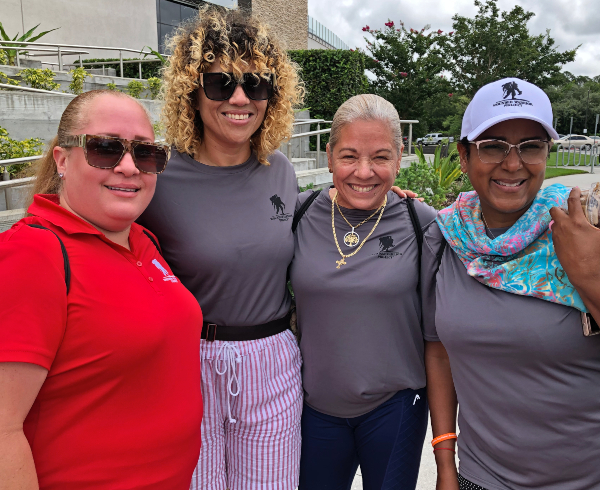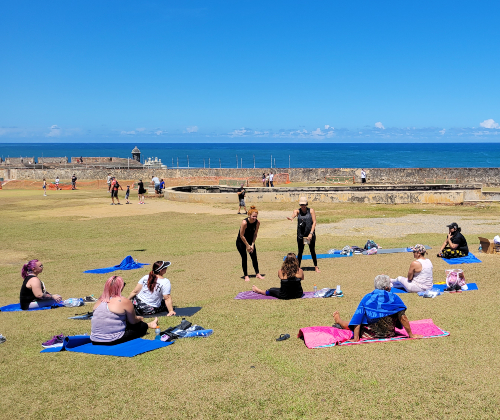Veteran Shines a Light for Other Women Warriors to Find a Safe Place

When Army veteran Elizabeth Martinez Gonzalez first separated from the military, she was ready to walk away from anything that reminded her of military life. After all, she felt the military had left her in the dark.
In her native Puerto Rico, most people did not associate a young-looking female with the National Guard, operating a detainee center at Guantanamo, or facing sexual harassment on the job. At 36, she figured she experienced enough trials while serving active duty, so she isolated herself, thinking it would be easy to lose herself in a dark house.
Then, a Wounded Warrior Project® (WWP) mental health program helped her find the strength to shine the light for herself and other female veterans.
“Before I attended a Project Odyssey workshop hosted by Wounded Warrior Project in 2017, my life was dark,” Elizabeth recalled. “I live a different life today — my mind and heart are open to sharing with other veterans.”
Project Odyssey® is WWP’s 12-week mental health program that uses adventure-based learning to help veterans manage and overcome their invisible wounds, enhance their resiliency skills, and live productive and fulfilling lives. The program starts with a five-day mental health workshop, where warriors step outside the comfort of their everyday routines. Based on their needs, warriors can participate in an all-male, all-female, or couples Project Odyssey.
“During my first Project Odyssey experience, I was quiet and wasn’t sure I wanted to be there because I had a bad experience in the military dealing with military sexual trauma,” Elizabeth said. “At that moment, I didn’t want to do anything that had to do with the military, but Wounded Warrior Project gave me the opportunity to find veterans to whom I could relate.
“I would say that Project Odyssey is what saved my life in 2017,” Elizabeth said.
The Female Veteran Connection
What resonated with Elizabeth was seeing how other female veterans faced some of the challenges she faced. Those shared experiences included career obstacles, like a glass ceiling and sexual harassment in the workplace
During Elizabeth’s service in the Puerto Rico National Guard, she experienced everything from “we don’t allow females in this unit,” to retaliation for rejecting sexual advances. Elizabeth fought back and was able to prove she was being targeted. But the reprisals and threats became relentless. Her command in Puerto Rico eventually steered her toward medical retirement after 14 years of active duty. Even after retirement, her pay was held for 10 months and she was unable to pay her utilities, eventually having her power disconnected — and literally living in the dark.
But, thankfully, her first experience with Project Odyssey led Elizabeth to connect with helpful resources, bond with other female warriors, and renew leadership opportunities. And today, Elizabeth is the first female platoon co-leader for The Mission Continues in Puerto Rico, and she is a peer mentor with WWP. In fact, she recently co-mentored a group of female veterans from Puerto Rico at a Project Odyssey.
Like the WWP logo, Elizabeth once was the warrior being carried off the battlefield. “That was me being carried until I went to that Project Odyssey in 2017,” Elizabeth said. “A couple of years later, I’m able to be someone who carries other female veterans and helps them find different programs that they may not have heard of in Puerto Rico.
Giving Back and Shining Her Light
Elizabeth understands the importance of being heard. She brings that to the peer support group she helps lead in Puerto Rico.
“Women need a safe place to be able to talk about their needs without judgment; in an environment with males, it can be a little inhibiting,” Elizabeth said.
Elizabeth added that listening and showing support goes a long way with veterans who sometimes feel overwhelmed when they get out of the house after going through periods of isolation.
In a 2020 survey of the women warriors WWP serves, nearly half of women warriors (49%) reported feeling isolated from others, indicating that social and personal support play a critical role in their transitions to civilian life from a military career.
WWP works to ensure no warrior ever feels alone. In addition to Project Odyssey and peer support groups, WWP offers mental health programs to assist women warriors in their journeys to recovery. The nonprofit also developed the Women Warriors Initiative to better understand, empower, and advocate for women warriors.
For Elizabeth, it is crucial to reach out to female veterans from the shared perspective of being women in the military. “I’ve been given a chance to give back through my lived experiences and be part of organizations that help me reach more people. While I have health, and God by my side, I will continue to show up for my peers and MST survivors.”
Contact: Raquel Rivas — Public Relations, rrivas@woundedwarriorproject.org, 904.426.9783
About Wounded Warrior Project
Since 2003, Wounded Warrior Project® (WWP) has been meeting the growing needs of warriors, their families, and caregivers — helping them achieve their highest ambition. Learn more.
